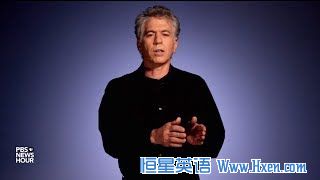英语访谈节目: 诗歌伴随着我们生命中的重要时刻
AMNA NAWAZ: It's National Poetry Month, whereby poetry is lauded in schools, libraries and bookstores all over the country. Poetry often gets a bad rap for being inaccessible, or too esoteric for most readers' tastes. But, tonight, poet and author David Gewanter shares his Humble Opinion on how, in fact, we use poetry in deeply important moments in our lives.

DAVID GEWANTER, Poet: Just the other day, I heard that poetry had died again. Poetry, the critics tell us, is too slow for our wired, sound-bitten world. I won't speak against these funeral directors of poetry. Who knows, they might tell me I'm dead too. But little shreds of poems are lying all around, like clumps of DNA found at the murder scene or some healthy virus passing when a body meets a body, coming through the rye. You don't need to be much of a detective to find it. We all carry bits of song with us, tatters of prayers, movie lines or advertising jingles. We pocket them as souvenirs to help us remember things, like carpentry's righty-tighty, lefty-loosey. Some poem viruses protect us, such as the sailor's rhyme: Red sky in morning, sailor take warning. So, poetry may be dead, but, as for poems, they don't rest in peace. They leave little twigs and thorns inside our heads, jabbing us awake. They witness our most vital moments. They warm our bedrooms and cheer the birth room. Poems reliably show up for graduations, weddings, and retirements, brimming with tearful homilies. And they never miss a funeral. Poems also help us through the prosaic days. I heard a couple having a not-heart-to-heart exchange, and thought of the two-liner from my teacher the poet Thom Gunn: Their relationship consisted in discussing if it existed. Years later, after Thom Gunn died, I wrote this dream poem about him walking by: My teacher limps on his heavy boot, the heel broken off. A cobbler's shop appears, and I buy the black nails, the hammer, glue and strapping. I work hard on it, bending there, until he speaks and walks on. But, as he is dead, his voice and step make no sound. So, poems give the past a second life. And poems help us move from who we are to who we want to become. They mix present life with our imagination and desires. Like a seat belt, crossing our hearts and loins, they define our position, even as we travel down the road. So, keep your poems close. The inner life you save may be your own.




 手机网站
手机网站